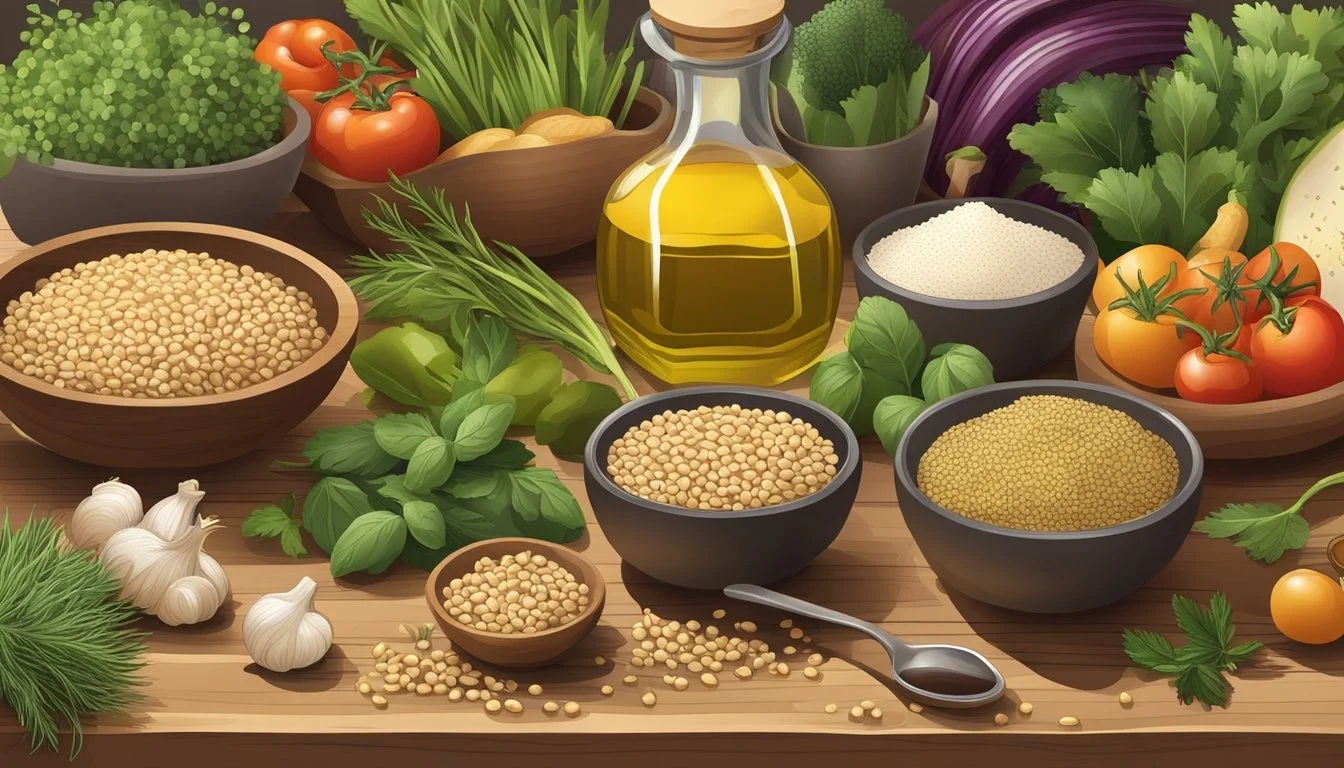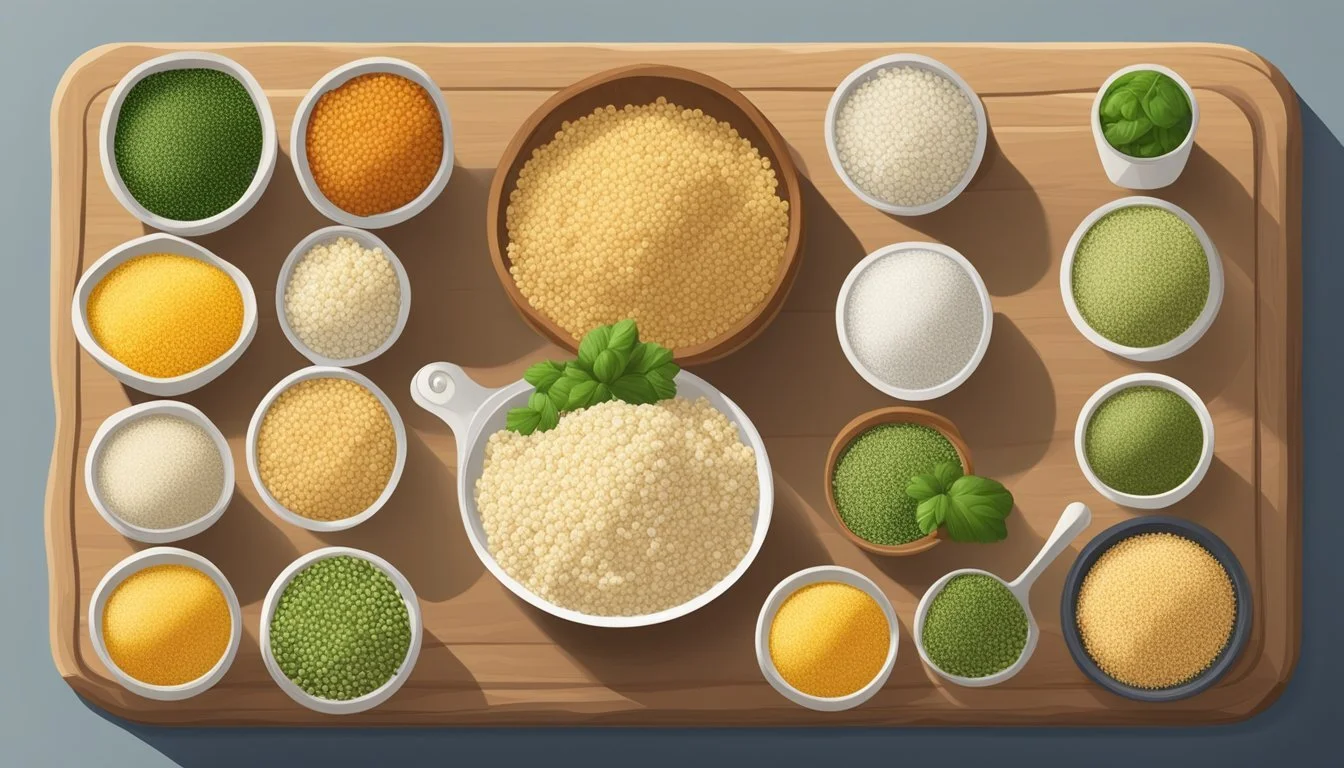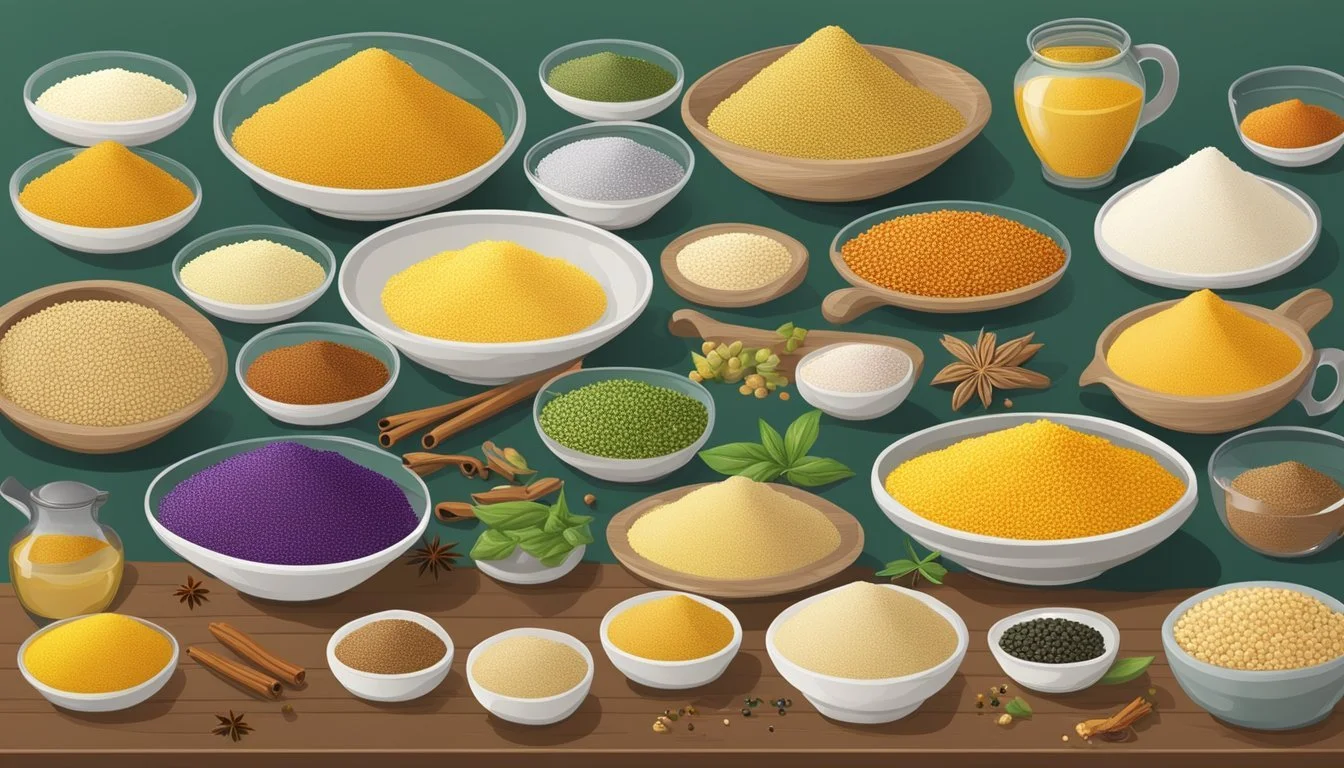Couscous Substitutes
Top Alternatives for Your Dishes
Couscous is a staple in many cuisines, particularly within North African countries such as Morocco, Algeria, and Tunisia. This granular semolina wheat product is beloved for its versatility and ability to absorb flavors. It often serves as a side dish or a base for stews and salads. However, various dietary needs and culinary preferences have led people to seek out alternatives to traditional couscous.
Substitutes for couscous come in many forms, catering to gluten-free, vegan, and health-conscious diets. Grains such as quinoa, rice, specifically Lundberg's organic roasted brown rice, and legumes like cooked lentils can be used as couscous alternatives without compromising on texture or flavor. These options not only diversify the menu but also offer different nutritional benefits, such as higher protein content with quinoa or a variety of essential vitamins and minerals found in brown rice.
Aside from grains and legumes, other innovative couscous substitutes include roasted cauliflower, which adds a unique dimension to dishes with its nutty and savory profile, or potato-based products that mimic the consistency and mouthfeel of couscous. These alternatives provide culinary creatives and those with specific dietary requirements the opportunity to enjoy dishes traditionally served with couscous.
Understanding Couscous
Couscous is a staple food with a storied history and a significant nutritional value, deeply embedded in North African and Middle Eastern cuisines.
Origins and Cultural Significance
Couscous originated in North Africa and has played a vital role in the region's food culture. Believed to have been prepared by the Berbers as early as the 7th century, it is a traditional staple across countries like Morocco, Algeria, and Tunisia. The preparation of couscous is often seen as an art, and it holds social importance in family gatherings and festive meals.
Nutritional Profile
Couscous is made from semolina, which comes from durum wheat, containing protein, fiber, and essential vitamins and minerals. Regular couscous provides nutrients such as:
Protein: Essential for muscle maintenance and growth
Fiber: Beneficial for digestive health
Iron, Magnesium, Phosphorus: Crucial for various body functions including oxygen transport and bone health
B Vitamins (notably Niacin and Folate): Support metabolic processes
Nutrient Value Per Serving Protein Varied, often around 6g per 1 cup (157g) cooked Fiber Up to 2g per serving Iron Varies by product Magnesium Varies by product Niacin Approximately 1.5mg Folate Approximately 23.6mcg
Couscous does contain gluten, so it is not suitable for those with gluten intolerances or celiac disease.
Couscous in Cuisine
Couscous is a versatile ingredient in North African cuisine, often steamed and served with flavorful stews and vegetables. It's a preferred base for dishes due to its mild flavor and granular texture, which soaks up the spices and herbs it's cooked with. Middle Eastern variations might serve it as a side dish, sometimes seasoned or combined with meats and other ingredients. The calorie content of couscous can vary, but it typically offers a lower calorie count than other grains, making it a favorite for health-conscious consumers.
Identifying Suitable Substitutes
When replacing couscous, the suitability of a substitute depends on dietary needs, desired nutritional content, and the ability to mimic couscous's texture and flavor.
Criteria for Substitution
To substitute couscous effectively, one must consider texture and flavor compatibility. The ideal substitute should have a granular consistency similar to couscous and a neutral taste that absorbs the flavors of other ingredients well.
Gluten-Free Alternatives
For individuals with gluten intolerance or celiac disease, gluten-free grains are essential. Quinoa, a complete protein source, is an excellent gluten-free alternative with a fluffy texture and mild, nutty flavor. Rice, particularly long-grain or medium-grain varieties, is another accessible gluten-free option, though its texture differs slightly from couscous. Millet, small in size like couscous, has a mild, sweet flavor, making it a good replacement in dishes. Lesser-known gluten-free grains like sorghum, amaranth, buckwheat, teff, and fonio also offer diverse textures and flavors, expanding the range of suitable substitutes.
Gluten-Free Grains Texture Flavor Quinoa Fluffy Nutty Rice Varies by type Neutral Millet Small; grainy Mild; sweet Amaranth Tiny; poppy Nutty; earthy Buckwheat Soft; chewy Rich; earthy
Whole Grain Varieties
Whole grains are not only nutritious but also provide a spectrum of textures that can approximate that of couscous. Barley and bulgur wheat, although containing gluten, offer a chewy texture and a hearty, whole grain flavor. These grains are frequently used in salads, soups, and side dishes as high-fiber, nutritious substitutes for couscous.
Low-Carb Options
Those following a low-carb diet might opt for vegetable-based substitutions. Finely chopped cauliflower or broccoli florets, when steamed and seasoned, can imitate the consistency of couscous and are significantly low in fat. Another alternative is shirataki rice, made from konjac root, which is nearly carb-free and can serve as a couscous stand-in for those reducing their carbohydrate intake.
Couscous Alternatives in Cooking
When seeking couscous alternatives for various dishes like salads, soups, or as a side, cooks can find a plethora of grains and non-grain options that cater to different dietary needs and flavor profiles. The key is to prepare these substitutes properly and to understand how they may be incorporated into recipes as replacements for couscous.
Preparing Substitutes
Proper preparation of couscous alternatives ensures that they will have the correct texture and flavor for the dish being prepared. Here are specifics for a selection of substitutes:
Quinoa: Rinse to remove bitterness, then cook in a 2:1 water-to-quinoa ratio until the grains are fluffy and water is absorbed.
Farro: Rinse off any debris, boil in water until chewy, and usually uses a 3:1 water-to-farro ratio.
Brown Rice: Requires a longer cooking time with a typical ratio of 2.5:1 water-to-rice.
Cauliflower Rice: Pulse cauliflower in a food processor until fine, then sauté or steam briefly to achieve desired tenderness.
Incorporating into Recipes
Couscous substitutes can be seamlessly incorporated into a variety of dishes. For each substitute, one must consider the distinct characteristics they bring:
In Salads: Opt for quinoa or cauliflower rice for a lighter, gluten-free option.
For Soups and Stews: Substitute like brown rice or farro can add heartiness and a chewy texture.
As a Side Dish: Any of these substitutes, appropriately seasoned, can serve as an accompaniment to the main dish.
In Pilafs: Quinoa and brown rice can be sautéed with aromatics before boiling to mimic traditional couscous pilafs.
For Porridge: Cooked farro with milk or a milk substitute can create a satisfying breakfast porridge.
When replacing couscous with these alternatives, one may need to adjust the seasoning levels to complement the substitute’s natural flavor. Each alternative brings a unique taste and texture to dishes, giving cooks the ability to create meals that cater to specific dietary needs without compromising on flavor or satisfaction.
Specialty Substitutes
Exploring specialty substitutes for couscous provides individuals with unique and health-conscious options, particularly suited for those with dietary restrictions or a penchant for creative cooking.
Lesser-Known Substitutes
Some lesser-known substitutes offer a similar texture and cooking experience to traditional couscous. Products like Liebers and Goldbaum provide alternative choices with unique blends. Liebers includes a mix of potato starch, potato flour, and potato flakes, enhanced with whole eggs and a hint of spices. Goldbaum's couscous substitute, on the other hand, might incorporate ingredients such as brown rice flour or quinoa flour to cater to gluten-free diets.
Innovative Vegetable Alternatives
Vegetables can serve as inventive and nutritious replacements for couscous, adding a burst of color and flavor to any dish.
Cauliflower Rice: Grated cauliflower simulates the grainy texture of couscous and offers a low-carb, gluten-free alternative rich in vitamins and antioxidants.
Broccoli Rice: Like cauliflower, broccoli can be minced to create a green, nutrient-packed couscous substitute.
Sweet Potato: Cubed or mashed, sweet potatoes lend a sweet, hearty flavor, and their dense nutritional profile makes them an excellent substitute in a range of recipes.
Companies like Lundberg and Streets might provide pre-made mixes like organic roasted brown rice couscous, which is both gluten-free and vegan, or couscous alternatives that incorporate these vegetable elements for an instant culinary twist.
When integrating these specialty substitutes into your cooking, it's crucial to remember that they may alter not just the flavor profile but also the nutritional content and cooking times of your dishes.
Health Considerations
When selecting a couscous substitute, considering the health implications related to dietary restrictions and nutritional content is crucial. Certain alternatives may align better with dietary needs such as gluten-free requirements or specific nutritional benefits that contribute to overall wellness.
Dietary Restrictions
For individuals with celiac disease or gluten sensitivity, couscous, which is made from semolina wheat, is not a viable option. Instead, gluten-free substitutes for couscous such as quinoa, which is naturally cholesterol-free and rich in protein, fiber, and micronutrients, can be an excellent choice. Other gluten-free alternatives include:
Brown rice: mirrors couscous in texture but is gluten-free.
Millet: a lesser-known grain that is also gluten-free.
Each of these grains meets the requirements of a gluten-free diet while providing a variety of nutritional benefits, such as additional fiber and essential vitamins.
Nutritional Comparisons
When comparing nutritional profiles, it is important to note that couscous contains valuable nutrients like B vitamins, iron, and magnesium. However, substitutes can either match or surpass these health benefits of couscous. Below is a comparison of couscous and a few common substitutes:
Substitute Fiber Iron Magnesium Additional Benefits Quinoa High High High Complete protein Brown Rice Medium Medium Medium Rich in selenium Cauliflower Low Low Low Ideal for low-carb diets
Substitutes like quinoa often boast a similar or superior nutritional profile compared to couscous, particularly for those requiring gluten-free alternatives. Additionally, for those on low-carb diets, options such as cauliflower rice provide a nutritious yet low-carb couscous substitute. It is essential to consider the entire nutritional profile, including fiber content and the presence of micronutrients, when choosing the best alternative for health and dietary needs.
International Couscous Variants
Couscous, a staple in North African cuisine, has varied interpretations across different cultures, each infusing regional flavors and techniques.
Regional Couscous Traditions
Moroccan Couscous: In Morocco, couscous often carries the essence of a lavish feast. It is traditionally steamed and served with a rich stew, often on Fridays for family gatherings. The Moroccan variety is typically hand-rolled, showcasing a meticulous culinary skill that’s been passed down through generations.
Middle Eastern & Mediterranean Couscous: Countries across the Middle East and the Mediterranean have embraced couscous, but with unique regional spins. Israeli couscous, also known as "ptitim," features larger, pearl-shaped grains and is frequently used in salads or as a side dish. It is toasted rather than dried, resulting in a distinct nutty flavor and chewy texture.
Italian Influence: Moving to Italy, particularly in Sicilian cuisine, couscous mirrors the island's cross-cultural history. Italian couscous might be served with a fish-based stew, integrating the robust Mediterranean flavors with the grain's versatility.
Modern Twists on Traditional Couscous
Innovative chefs and home cooks around the globe have introduced modern interpretations of couscous, blending traditional and contemporary techniques. These creations respect the grain’s roots while adapting to the evolving tastes and dietary preferences of a global audience.
North African cuisine's influence has led to new wave couscous dishes that incorporate fresh, locally sourced ingredients, while still honoring the time-honored processes of preparation, such as the hand-rolled method that remains a benchmark of quality and authenticity in couscous preparation. The adaptability of couscous allows it to effortlessly merge with various international ingredients, securing its place both in traditional and modern kitchens.
Shopping Guide for Couscous Substitutes
When searching for couscous substitutes, consumers should focus on finding options that offer a similar texture and nutritional profile, such as adequate protein, fiber, and essential minerals like iron and selenium.
Selecting Quality Substitutes
Shoppers should look for substitutes that provide a balance of carbohydrates, protein, and fiber. Quinoa stands out as a nutritious alternative, rich in protein and fiber, and it is also gluten-free, which is ideal for those with dietary restrictions. Barley is another excellent choice, offering a chewy texture and nutty flavor, plus higher levels of fiber and protein compared to couscous.
In terms of grains that are closer in texture to couscous, basmati and jasmine rice serve as fine replacements with their fluffy and slightly sticky consistency when cooked. Although these rice varieties have less fiber, they can be a suitable alternative for dishes where a similar mouthfeel to couscous is desired.
Grains like cooked rice should be considered for their versatility. Mediterranean diets often utilize various rices as a base for dishes traditionally made with couscous, taking advantage of their carbohydrate content and capacity to absorb flavors.
Brand Recommendations
When selecting a brand, shoppers should consider those known for quality and nutritional value. Lundberg is a reputable brand that offers a range of whole-grain products, including a gluten-free couscous made from organic roasted brown rice, thus providing a good amount of fiber and protein.
For a convenient and gluten-free option, Goldbaum and Liebers offer couscous substitutes that include ingredients like potato starch and potato flour. They can come enriched with iron and calcium, plus a variety of flavors with the addition of spices and herbs.
Here is a short comparison table for some of the recommended brands:
Brand Base Ingredient Gluten-Free Notable Nutrients Lundberg Brown Rice Yes Fiber, Protein, Iron Quinoa Quinoa Seeds Yes Fiber, Protein, Iron Goldbaum Potato Starch Yes Iron, Calcium Liebers Potato Flour Yes Iron, Calcium
Consumers should also consider that while some of these substitutes may be available in regular supermarkets, specialty or health food stores often provide a wider variety of healthier and organic options. For those who prioritize convenience, several of these substitutes can also be found online.
Conclusion
Exploring various couscous substitutes can cater to dietary preferences and restrictions while offering diverse flavors and nutritional profiles. Each alternative provides a unique texture and taste that can complement different recipes.
Quinoa is an excellent substitute, offering a nutty flavor and a protein-rich profile. Barley, with its chewy texture, is best suited for heartier dishes. For a lighter alternative, cauliflower rice stands out due to its low carbohydrate content and its ability to mimic the texture of traditional couscous.
For those with gluten sensitivities, substitutes like cooked rice, especially short-grain varieties, and millet present viable options. Cooked lentils can also serve as an alternative, bringing in a variety of nutrients alongside their distinct earthy flavor.
Substitute Texture Flavor Notes Dietary Consideration Quinoa Similar to couscous Nutty Gluten-free Barley Chewy Rich, nut-like Contains gluten Cauliflower Rice Light and fluffy Mild Gluten-free, Low-carb Cooked Rice Varied Neutral Gluten-free Millet Similar to couscous Mild Gluten-free Cooked Lentils Soft Earthy Gluten-free
Incorporating these substitutes into meals not only provides versatility but also ensures that nutritional value is not compromised. It is important to consider cooking times and liquid absorption rates as they can differ from couscous. These factors can influence the outcome of the dish and should be adjusted accordingly.






